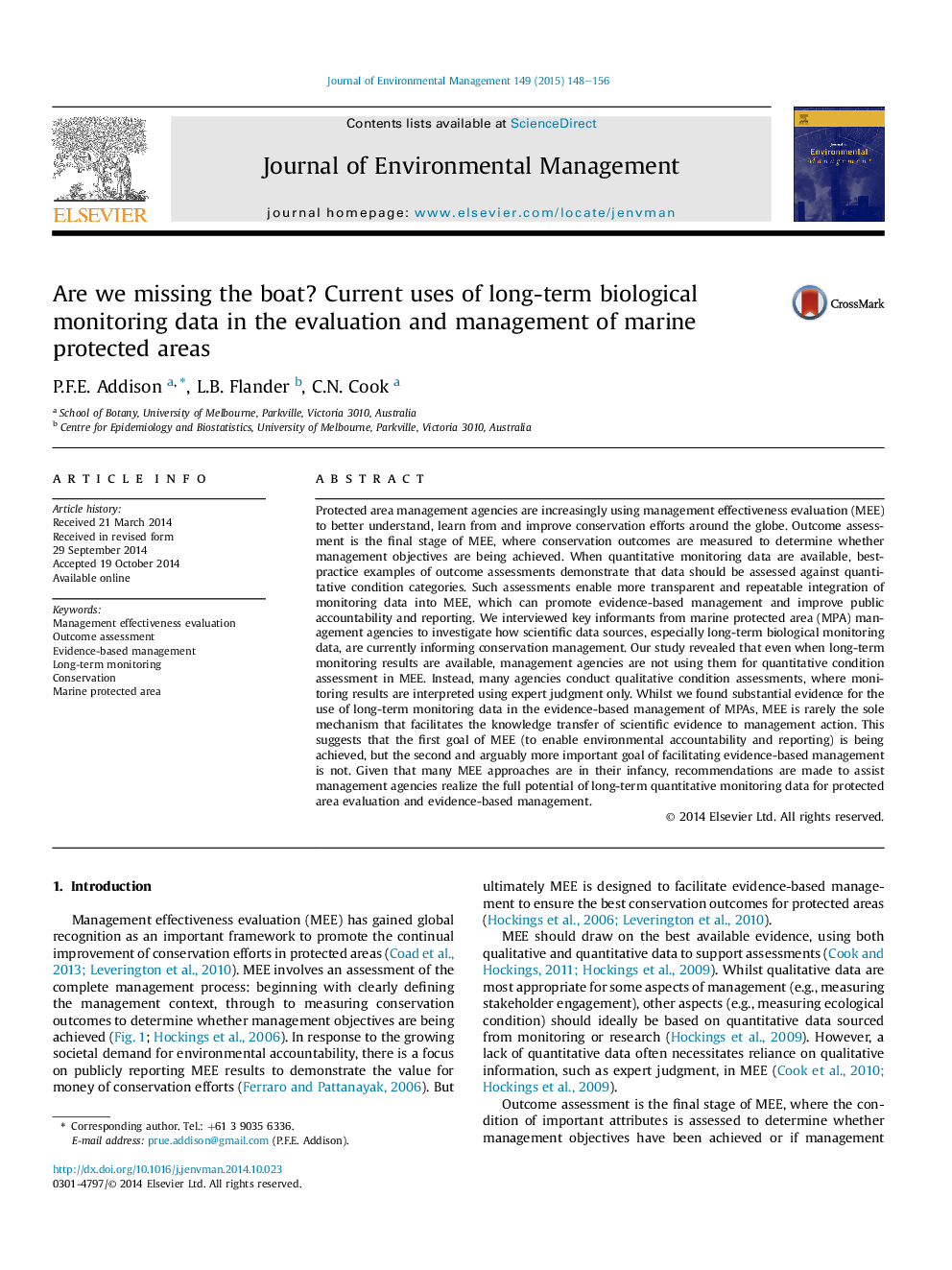| کد مقاله | کد نشریه | سال انتشار | مقاله انگلیسی | نسخه تمام متن |
|---|---|---|---|---|
| 7483208 | 1485263 | 2015 | 9 صفحه PDF | دانلود رایگان |
عنوان انگلیسی مقاله ISI
Are we missing the boat? Current uses of long-term biological monitoring data in the evaluation and management of marine protected areas
ترجمه فارسی عنوان
آیا ما قایق را از دست می دهیم؟ استفاده های جاری از داده های نظارت زیست محیطی طولانی مدت در ارزیابی و مدیریت مناطق حفاظت شده دریایی
دانلود مقاله + سفارش ترجمه
دانلود مقاله ISI انگلیسی
رایگان برای ایرانیان
کلمات کلیدی
ارزیابی اثربخشی مدیریت، ارزیابی نتیجه، مدیریت مبتنی بر شواهد، نظارت بلند مدت، حفاظت، منطقه حفاظت شده دریایی،
موضوعات مرتبط
مهندسی و علوم پایه
مهندسی انرژی
انرژی های تجدید پذیر، توسعه پایدار و محیط زیست
چکیده انگلیسی
Protected area management agencies are increasingly using management effectiveness evaluation (MEE) to better understand, learn from and improve conservation efforts around the globe. Outcome assessment is the final stage of MEE, where conservation outcomes are measured to determine whether management objectives are being achieved. When quantitative monitoring data are available, best-practice examples of outcome assessments demonstrate that data should be assessed against quantitative condition categories. Such assessments enable more transparent and repeatable integration of monitoring data into MEE, which can promote evidence-based management and improve public accountability and reporting. We interviewed key informants from marine protected area (MPA) management agencies to investigate how scientific data sources, especially long-term biological monitoring data, are currently informing conservation management. Our study revealed that even when long-term monitoring results are available, management agencies are not using them for quantitative condition assessment in MEE. Instead, many agencies conduct qualitative condition assessments, where monitoring results are interpreted using expert judgment only. Whilst we found substantial evidence for the use of long-term monitoring data in the evidence-based management of MPAs, MEE is rarely the sole mechanism that facilitates the knowledge transfer of scientific evidence to management action. This suggests that the first goal of MEE (to enable environmental accountability and reporting) is being achieved, but the second and arguably more important goal of facilitating evidence-based management is not. Given that many MEE approaches are in their infancy, recommendations are made to assist management agencies realize the full potential of long-term quantitative monitoring data for protected area evaluation and evidence-based management.
ناشر
Database: Elsevier - ScienceDirect (ساینس دایرکت)
Journal: Journal of Environmental Management - Volume 149, 1 February 2015, Pages 148-156
Journal: Journal of Environmental Management - Volume 149, 1 February 2015, Pages 148-156
نویسندگان
P.F.E. Addison, L.B. Flander, C.N. Cook,
